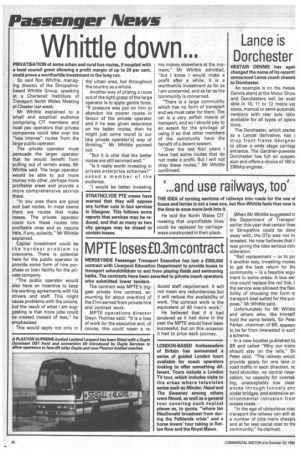Whittle down...
Page 16

If you've noticed an error in this article please click here to report it so we can fix it.
PRIVATISATION of some urban and rural bus routes, if coupled with a local council grant allowing a profit margin of up to 20 per cent, could prove a worthwhile investment long in the run.
So said Ron Whittle, managing director of the Shropshirebased Whittle Group, speaking at a Chartered lnstititute of Transport North Wales Meeting at Chester last week.
Mr Whittle explained to a small and sceptical audience comprising CIT members and local psv operators that private companies could take over the "less intense" routes from the large public operator.
The private operator must persuade the larger operator that he would benefit from pulling out of certain areas, Mr Whittle said. The large operator would be able to put more money into other, perhaps more profitable areas and provide a more comprehensive service there.
"In any area there are good and bad routes. In most towns there are routes that make losses. The private operator could turn these routes into profitable ones and so require little, if any, subsidy," Mr Whittle explained.
Capital investment could be the hardest problem to overcome. There is potential here for the public operator to provide some form of hire purchase or loan facility for the private company.
"The public operator would also have an incentive to keep his working agreements with his drivers and staff. This might cause problems with the unions, but the result of what I am suggesting is that more jobs could be created instead of less," he emphasised.
This would apply not only in the urban area, but throughout the country as a whole.
Another way of prising a route out of the tight grasp of the large operator is to apply gentle force. "If pressure was put on him to abandon his poorer routes in favour of the private operator and if he was given assurance on his better routes, then he might just come round to our fthe private operator's] way of thinking," Mr Whittle pointed
out.
"But it is vital that the better routes are still serviced well."
"Is it really worth investing in private enterprise schemes?" asked a member of the audience.
"I would be better investing my money elsewhere at the mo ment," Mr Whittle admitted, "but I know I would make a profit after a while. It is a worthwhile investment as far as I am concerned, and as far as the community is concerned.
"There is a large community which has no form of transport and we must cater for them. The car is a very selfish means of transport, and so I should pay to an extent for the privilege of using it so that other members of the community have the benefit of a decent system. "Over the last four years I to allow a wide stage carriag( have had some routes that do not make a profit. But I will not drop these routes," Mr Whittle confirmed.


















































































































